Several authors — including Anthony Slater of The Athletic, Sam Amick of The Athletic, and Ramona Shelburne and Kendra Andrews of ESPN — have written recent stories about Klay Thompson‘s departure from the Warriors, with various sourced details from within the organization and those close to Thompson.
All three stories indicate there have been multiple incidents from both sides over the years that “splintered” the relationship, but perhaps most importantly was majority owner Joe Lacob spearheading a “cold, mostly uncommunicative approach to Thompson’s next contract in his three summers of extension eligibility,” a source tell Slater. While that may have been a common negotiating tactic for Lacob with key Warriors stakeholders over the years, the 34-year-old swingman “operates on his own wavelength,” as Slater writes.
According to Shelburne and Andrews, Thompson was “miserable” over the past year-plus for several reasons, including disappointing contract negotiations and a perceived disrespect that the Warriors had chosen to extend or re-sign players like Andrew Wiggins, Jordan Poole and Draymond Green but were unwilling to give him long-term security. It was also difficult for Thompson to reconcile with the fact that he was no longer physically able to be the same player after a pair of major injuries — a torn ACL and a torn Achilles tendon — cost him two-and-a-half seasons.
Thompson’s discontent was palpable throughout the 2023/24 season, which saw him benched at one point before he reclaimed his starting job to close the campaign. Sources tell ESPN that Thompson’s actions exasperated “even his loyalists in the locker room” last season. He also had several “emotional meetings” with head coach Steve Kerr, who said after the season ended he wanted to bring Thompson off the bench and reduce his minutes in ’24/25, per Slater.
While it has been reported multiple times that the Warriors offered Thompson a two-year extension worth around $48MM last offseason, the team’s front office evidently did not keep that offer on the table during the season. According to ESPN’s duo, Thompson’s agents put “at least four” contract proposals on the table and each were declined, with the team saying it wanted to wait. The final offer came in at about $40MM over two seasons, per Shelburne and Andrews. The Warriors never made counteroffers, according to Amick.
Sources tell Slater that Thompson asked Stephen Curry not to put pressure on the front office and ownership to bring his longtime backcourt partner back, as Thompson wanted the team’s interest to come organically. ESPN’s authors hear that Thompson also spoke to Kerr and Green and told them similarly.
According to Slater, once it became clear that re-signing Thompson wasn’t a top priority for the Warriors and that they wanted him to be patient as they attended to other business, Thompson’s decision became “easy.” Thompson never received a formal offer from Golden State in free agency, but several sources tell Slater the 34-year-old unofficially decided to leave weeks prior.
Being heavily scrutinized in a large market weighed on Thompson, and he was looking for a “fresh start” with a new organization. He “loved watching” the Mavericks‘ run to the NBA Finals, and was also interested in playing for the Thunder and Lakers, per ESPN.
Dallas was Thompson’s top choice, both for his potential fit alongside Luka Doncic and Kyrie Irving and for being in a media environment that is a little more laid back. Thompson played with former rival Irving on Team USA in the 2016 Olympics and the two were in regular contact about the possibility of teaming up in Dallas, according to Amick, who adds that Thompson viewed the Mavs as his best chance to win a fifth championship ring.
Oklahoma City had interest in Thompson but used its cap room to sign Isaiah Hartenstein in free agency, Shelburne and Andrews note. Thompson had “positive” conversations with key Lakers stakeholders like LeBron James, J.J. Redick and Rob Pelinka, and L.A. was willing to offer him a four-year, $80MM contract as part of a sign-and-trade; however, sources tell Amick that offer was contingent on the Lakers convincing Golden State to take back D’Angelo Russell (he also could have been routed to a third team).
Ultimately, Thompson had reservations about the attention playing in Los Angeles would bring, thinking it would be too similar to the unhappy end to his tenure with Golden State, per ESPN’s authors. Despite offering less money (he’ll reportedly receive $50MM over three years in the sign-and-trade), Thompson liked the fit with the Mavs, who made him their top priority in a meeting led by GM Nico Harrison and VP of basketball operations Michael Finley, as Amick writes.
All three stories have more details on Thompson’s departure and decision to join the Mavericks and are worth reading in full.
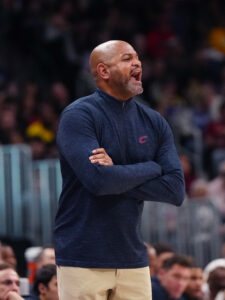 “I am pleased to have J.B. joining our franchise and commend our front office team on leading an extensive search,” team owner Tom Gores said in a statement. “This is a pivotal time, and we need a leader who can immediately instill a culture of growth, development, and inspiration. After spending time with J.B., it’s clear he is a passionate teacher with a competitive spirit who knows what it takes to win in today’s NBA. He’s also a strong communicator, which provides great synergy with Trajan and the front office team we have assembled. He will be an outstanding partner in helping our players maximize their potential and compete consistently.”
“I am pleased to have J.B. joining our franchise and commend our front office team on leading an extensive search,” team owner Tom Gores said in a statement. “This is a pivotal time, and we need a leader who can immediately instill a culture of growth, development, and inspiration. After spending time with J.B., it’s clear he is a passionate teacher with a competitive spirit who knows what it takes to win in today’s NBA. He’s also a strong communicator, which provides great synergy with Trajan and the front office team we have assembled. He will be an outstanding partner in helping our players maximize their potential and compete consistently.” McMillan and Brooks are the first assistants confirmed to be joining Redick’s staff. The Lakers had been looking for experienced coaches as former NBA sharpshooter Redick is a first-time head coach. ESPN’s Dave McMenamin recently reported (
McMillan and Brooks are the first assistants confirmed to be joining Redick’s staff. The Lakers had been looking for experienced coaches as former NBA sharpshooter Redick is a first-time head coach. ESPN’s Dave McMenamin recently reported (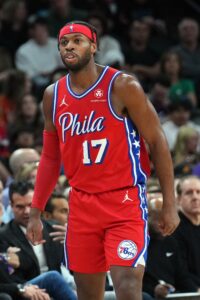 While Golden State is parting ways this offseason with
While Golden State is parting ways this offseason with 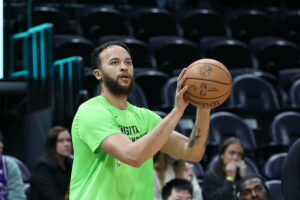 The Timberwolves will receive a future second-round pick swap and cash in the sign-and-trade, Wojnarowski adds (
The Timberwolves will receive a future second-round pick swap and cash in the sign-and-trade, Wojnarowski adds (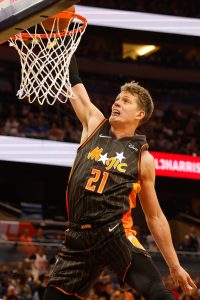 JULY 2:
JULY 2: 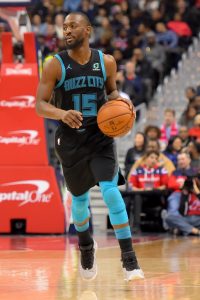 “I want to start this by thanking God for everything he has given me. Basketball has done more for me than I could’ve ever imagined, and I am super thankful for the amazing journey I’ve had,” Walker said in his announcement. “With that, I’m here to share that I am officially retiring from the game of basketball. This has all been a dream. When I look back, I still can’t believe the things I achieved in my career.
“I want to start this by thanking God for everything he has given me. Basketball has done more for me than I could’ve ever imagined, and I am super thankful for the amazing journey I’ve had,” Walker said in his announcement. “With that, I’m here to share that I am officially retiring from the game of basketball. This has all been a dream. When I look back, I still can’t believe the things I achieved in my career.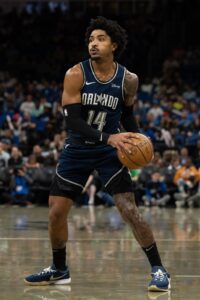 JULY 2: Harris’ deal will actually be worth $15MM over two years, a source tells Wojnarowski (
JULY 2: Harris’ deal will actually be worth $15MM over two years, a source tells Wojnarowski (